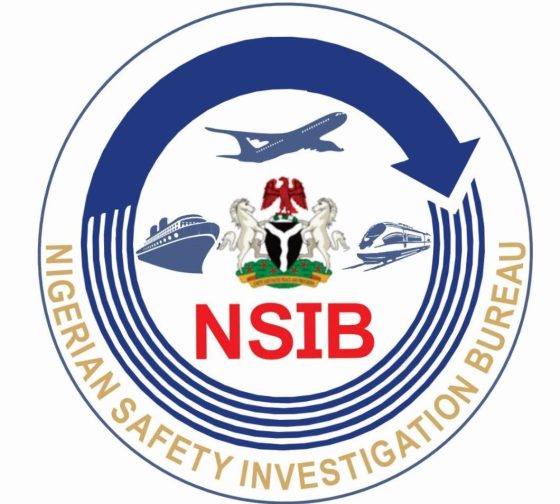A Call for Enhanced Safety: Investigating the Allied Air Incident at Abuja Airport
On December 11, 2024, a Boeing 737-400 cargo aircraft, operated by Allied Air and registered as 5N-JRT, experienced a significant incident upon landing at Nnamdi Azikiwe International Airport, Abuja. The aircraft, tasked with transporting cargo for the Central Bank of Nigeria, encountered a malfunction in its flap system during the final approach. This malfunction led to a cascade of events, culminating in the collapse of the right main landing gear. As the aircraft touched down, the impact caused the number two engine nacelle to scrape along the runway surface, forcing the plane to veer off course and onto the grassy verge. Remarkably, all six occupants onboard escaped unharmed.
The Nigerian Safety Investigation Bureau (NSIB), the agency responsible for investigating aviation accidents and incidents, launched a thorough investigation to determine the root cause of the incident and prevent similar occurrences in the future. Their preliminary report highlighted the urgency of conducting a comprehensive inspection of Allied Air’s fleet, focusing particularly on the flap and landing gear systems. The NSIB emphasized the importance of this proactive measure to ensure the continued airworthiness of the airline’s aircraft. This recommendation underscores the critical role of robust safety protocols and continuous oversight in maintaining aviation safety standards.
The NSIB’s preliminary findings revealed that the flight crew, all holding valid and current licenses, heard a distinct "bang" emanating from the right side of the aircraft as the wheels made contact with the runway. This auditory clue, combined with the subsequent collapse of the landing gear, suggests a potential mechanical failure. The aircraft, which had arrived from Douala, Cameroon, on the day of the incident, had no prior recorded defects in its technical logbook. The planned itinerary for the day included six sectors: Lagos-Abuja, Abuja-Sokoto, Sokoto-Abuja, Abuja-Yola, Yola-Abuja, and finally, Abuja-Lagos, with the same flight crew scheduled to operate all legs. The incident occurred during the first leg of this multi-sector flight plan.
To gain a deeper understanding of the events leading to the incident, the NSIB has outlined a comprehensive scope for their ongoing investigation. This includes a meticulous examination of the right main landing gear assembly, subjecting it to rigorous testing to identify any potential weaknesses or failures. Furthermore, the flap drive system components, encompassing transmission assemblies and actuators, will undergo detailed scrutiny to ascertain their operational integrity. The main wheel tires will also be analyzed for any signs of wear and tear or defects that could have contributed to the incident.
The incident involving Allied Air’s Boeing 737-400 serves as a stark reminder of the complex interplay of factors that contribute to aviation safety. While the immediate cause appeared to be a mechanical malfunction, the NSIB’s investigation will delve deeper into the contributing factors, including maintenance records, operational procedures, and environmental conditions. The preliminary report’s call for a closer examination of Allied Air’s fleet highlights the importance of proactive safety measures, going beyond reactive investigations after an incident has occurred. This proactive approach is essential to mitigating risks and ensuring the highest safety standards within the Nigerian aviation industry.
The NSIB’s preliminary findings, while crucial in directing the immediate course of action, represent just the initial phase of a more comprehensive investigation. The final report, which will be released upon completion of the investigation, will provide a detailed analysis of the incident, encompassing all contributing factors and offering specific recommendations aimed at preventing future incidents. This meticulous approach underscores the NSIB’s commitment to enhancing aviation safety through rigorous investigation and the implementation of evidence-based recommendations. The incident serves as a valuable learning opportunity for the aviation industry as a whole, reinforcing the importance of proactive safety measures and continuous improvement.
The collaboration between the NSIB and the Nigeria Civil Aviation Authority (NCAA) is essential in addressing the safety concerns raised by this incident. The NSIB’s recommendation for a discreet inspection of Allied Air’s fleet empowers the NCAA to take proactive steps to ensure the airworthiness of the airline’s aircraft. This collaborative effort reinforces the shared responsibility for aviation safety, ensuring that all stakeholders work together to mitigate risks and protect the lives of passengers and crew. The incident also highlights the crucial role of transparency and communication in maintaining public trust and confidence in the aviation industry.
The incident underscores the importance of a robust safety management system (SMS) within airlines and the wider aviation industry. An effective SMS provides a structured approach to managing safety risks, encompassing proactive hazard identification, risk assessment, and the implementation of mitigation strategies. The Allied Air incident highlights the need for continuous improvement in SMS implementation and oversight, ensuring that potential hazards are identified and addressed before they escalate into incidents. This proactive approach to safety management is essential for fostering a safety culture that prioritizes risk mitigation and continuous learning.
The incident involving Allied Air’s Boeing 737-400 serves as a crucial case study for aviation safety professionals, emphasizing the importance of thorough investigation, proactive safety measures, and continuous improvement. The NSIB’s comprehensive investigation and subsequent recommendations will play a vital role in enhancing aviation safety standards, not only within Nigeria but also contributing to best practices globally. The lessons learned from this incident will contribute to a safer and more resilient aviation industry, committed to upholding the highest standards of safety and operational excellence.














